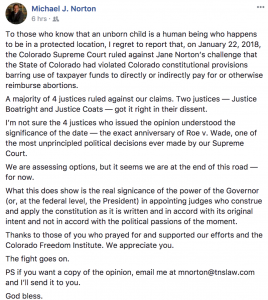 Conservatives across the country have long sought to ban any public funds from going to Planned Parenthood because the organization performs abortions.
Conservatives across the country have long sought to ban any public funds from going to Planned Parenthood because the organization performs abortions.
But in Colorado, and at the federal level, tax dollars cannot by law be spent on abortion care, and so any tax dollars that go to Planned Parenthood are intended to be used for non-abortion health care services, such as breast cancer screenings, for low-income earners on Medicaid or other programs.
That’s not good enough for Jane Norton, who led Colorado’s Department of Public Health and Environment under Gov. Bill Owens in 1999.
Norton believes tax dollars that go to Planned Parenthood, even if they are used for services like cancer screenings, actually subsidize abortion, and therefore allocating money to Planned Parenthood violates Colorado’s constitutional ban on public funding of abortions.
After Norton left CDPHE, she decided to sue the state of Colorado over the issue, seeking to defund Planned Parenthood.
On Monday, the Colorado Supreme Court threw out her lawsuit in a 4-2 decision.
Writing for the majority in the case, Chief Justice Nancy E. Rice affirmed a lower court decision that banning indirect funding of abortion, as Norton’s lawsuit sought to do, would lead to an “absurd result,” such as the possibility that a state employee could be banned from donating to an organization that offers abortions because his state salary would be indirectly providing public funds for abortion.
“Today’s victory is a win for over 103,000 patients we care for every year, who trust us to provide them quality health care. This court case was always just a sideshow from extremists with a harmful agenda,” said Vicki Cowart, President of Planned Parenthood of the Rocky Mountains in a statement earlier this week.
Anti-abortion activists see the Supreme Court decision as a setback.
Writing in a Facebook post to “those who know that an unborn child is a human being who happens to be in a protected location,” one of Norton’s attorneys, Michael J. Norton, argued that the court had made a grave mistake, fueled by ideology, not the law.
“We are assessing options, but it seems we are at the end of this road, for now,” wrote Norton, who represented the anti-LGBT, anti-abortion Alliance Defending Freedom (ADF) in the Planned Parenthood case. ADF is also representing the Colorado baker who discriminated against a gay couple by refusing to sell them a wedding cake.
The Planned Parenthood case could come up in Colorado’s gubernatorial race. In their legal brief arguing that Planned Parenthood should be defunded, Norton’s lawyers pointed out that Colorado Attorney General Cynthia Coffman, who is now running for governor, has backed Norton’s legal argument to defund Planned Parenthood, even though she’s been presenting herself as a moderate on abortion issues.
Coffman has not commented on the case and did not respond to an email inquiry.




